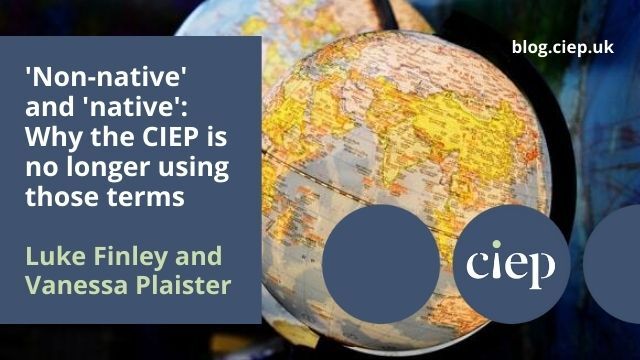EDI director Luke Finley and community director Vanessa Plaister explain why the CIEP is calling time on the terms ‘native speaker’ and ‘non-native speaker’.
 What’s the problem?
What’s the problem?
The phrases ‘native speaker’ and ‘non-native speaker’ are still common in our field and related areas such as translation and ESL teaching. But there’s a strong argument that they are unhelpful at best and that at worst they perpetuate assumptions about language competence that have an exclusionary effect.
The CIEP has been keeping up to date with that thinking. Increasingly, those of us writing as the CIEP have instead used more precise phrases. Now, we’ve decided to make that decision formal: the CIEP style guide will ask its authors not to use ‘native’ and ‘non-native’ to differentiate English speakers according to where they’re from, where they’re based or which variant of English they use.
Why are we doing this?
Whether we mean to or not, when we identify someone as ‘non-native’ we relegate them to an ‘out-group’ – we other them. And, beyond geography, the word has possible connotations about what else that person is excluded from, including rights, status and language.
Boosting belonging
Does an accident of birth make a language – particularly when that language has myriad global variants – inherently more ours than someone else’s?
Many of us would answer ‘no’ – yet when we don’t consciously reflect on it, it’s all too easy to position those Englishes hierarchically or competitively. British and US English vie for first place based on their respective histories; Australian, Irish, Canadian, New Zealand and South African English follow on closely – and the rest straggle along at the back. It’s no coincidence the winners in that race are mostly majority-white, ‘Western’ nations – the nations that colonised and imposed English on the others, or the ones in which those colonisers settled.
Sharing ownership
In fact, while we may consciously reject vehemently the idea that English language competence is tied to racial identity (or presumed racial identity based on skin colour), it’s worth reflecting candidly on the mental picture that forms when we use the words ‘native English speaker’. Even if you genuinely think of someone from the Punjab, the words can act as a dog whistle to others who think they know what you really mean. And that’s an unacceptable risk in the context of the CIEP’s global membership.
If it ever did – because it is a language formed over centuries of global influences – English no longer belongs inherently to one geographical community. It’s the language of global communication, spoken fluently by more people than any other. And that fluency can come from acquiring English as a first language or from learning it more formally.
Challenging assumptions
As all editors learn, being fluent in a language is far from enough to make you a good editor. Significantly, those who learn it as a second or other language often have a better, more systematic understanding of its grammar and how to describe it than those who’ve used it all their lives. And while fluency may imply that a person has a more instinctive way of choosing their words, a larger vocabulary and a comfort with slang or idiom, is that necessarily always an advantage? These things may make a language richer, but they don’t necessarily allow us to communicate clearly, quickly or as widely as possible within a global marketplace.
What’s the alternative?
As is so often the answer: it depends.
When we see the words in context, we will think about what our writers really mean.
In many cases, the solution may be to refer to people using English as a first language or as a second or other language.
But even then, this might be tied up with an ill-founded hierarchy of competence – with assumptions about who can speak, and edit, English effectively. Perhaps we mean simply a multilingual author or someone still learning the language. Perhaps we’re talking specifically about the linguistic foibles or needs of that individual.
Or it could be that the phrase just marks out the subject as someone from a different background to the writer. In such cases, it may be that not only the words ‘native’ and ‘non-native’ but the distinction itself is unnecessary. In those instances, we might decide instead to delete the words.
In short, the terms ‘native’ and ‘non-native’ are imprecise, potentially racially loaded and fraught with issues of ownership and power – of who gets to define what is a ‘good or bad’, ‘correct or incorrect’, use of a language. This is why, as an association of members centred in the UK but spread across the world, those of us responsible for positioning the CIEP securely within that global editing community have decided to stop using them.
About Vanessa and Luke
Vanessa Plaister has been the CIEP’s community director since 2018. Luke Finley became the CIEP’s first equality, diversity and inclusion director in early 2021.
 About the CIEP
About the CIEP
The Chartered Institute of Editing and Proofreading (CIEP) is a non-profit body promoting excellence in English language editing. We set and demonstrate editorial standards, and we are a community, training hub and support network for editorial professionals – the people who work to make text accurate, clear and fit for purpose.
Find out more about:
Photo credit: globes by Duangphorn Wiriya on Unsplash.
Posted by Abi Saffrey, CIEP blog coordinator.
